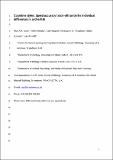Cognitive styles : speed–accuracy trade-offs underlie individual differences in archerfish
Abstract
Individuals exhibit consistent differences in behaviour and related cognitive performance. ‘Cognitive styles’-based hypotheses suggest the trade-off between speed and accuracy is an important factor where an individual's behavioural traits and linked decision speeds may account for its cognitive performance. The expected relationship between accuracy and decision speed, however, is not always clear and some studies have suggested that faster individuals do not suffer the expected cost to accuracy. Contradictory findings may be attributed to taxon-specific differences but may also be due to the difficulty in separating intraindividual from interindividual variation or the use of insufficiently challenging tasks in tests. We trained archerfish, Toxotes chatareus, to shoot at artificial targets for food, and then conducted a visual discrimination study to test the cognitive styles hypothesis. To reduce potential confounding effects, we used a longitudinal design, and increased the challenge of the test by using differentially rewarded targets. We also tested fish in one of two conditions with either two or three targets in each test. As expected, archerfish showed repeatable differences in latency to shoot and consistently fast individuals were quicker to achieve initial learning criteria than slower individuals. Repeated tests revealed an inverse relationship between discrimination accuracy and speed, with slower individuals having greater accuracy in initial trials on each day, supporting the cognitive styles hypothesis. However, this relationship was statistically significant only in the three-target condition, underscoring how task design can strongly affect the ability of researchers to detect robust individual variation in cognition. Taken together, our results support the hypothesis that speed–accuracy trade-offs can underlie some observed interindividual differences in cognition.
Citation
Jones , N A R , Webster , M , Newport , C , Templeton , C N , Schuster , S & Rendell , L 2020 , ' Cognitive styles : speed–accuracy trade-offs underlie individual differences in archerfish ' , Animal Behaviour , vol. 160 , pp. 1-14 . https://doi.org/10.1016/j.anbehav.2019.11.019
Publication
Animal Behaviour
Status
Peer reviewed
ISSN
0003-3472Type
Journal article
Description
This work was supported by the Fisheries Society of the British Isles through a PhD studentship to N.A.R.J. C.N. was funded by the European Union's Horizon 2020 Research and Innovation Programme under the Marie Sklodowska-Curie grant agreement (CN: 659684).Collections
Items in the St Andrews Research Repository are protected by copyright, with all rights reserved, unless otherwise indicated.

